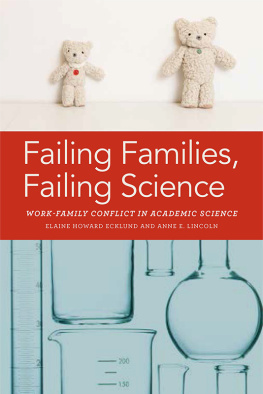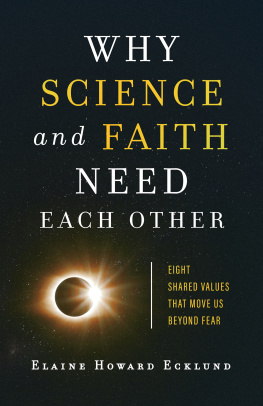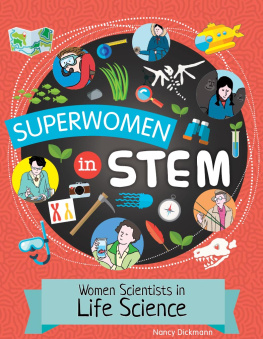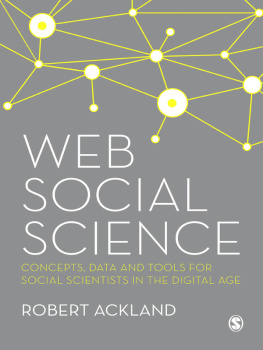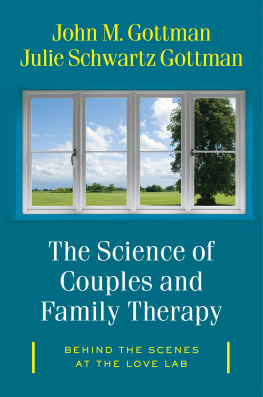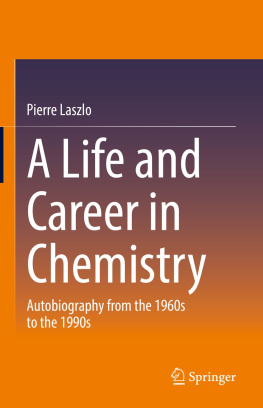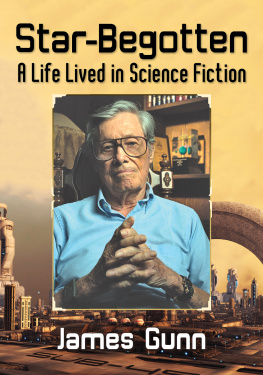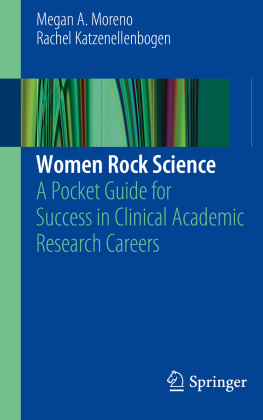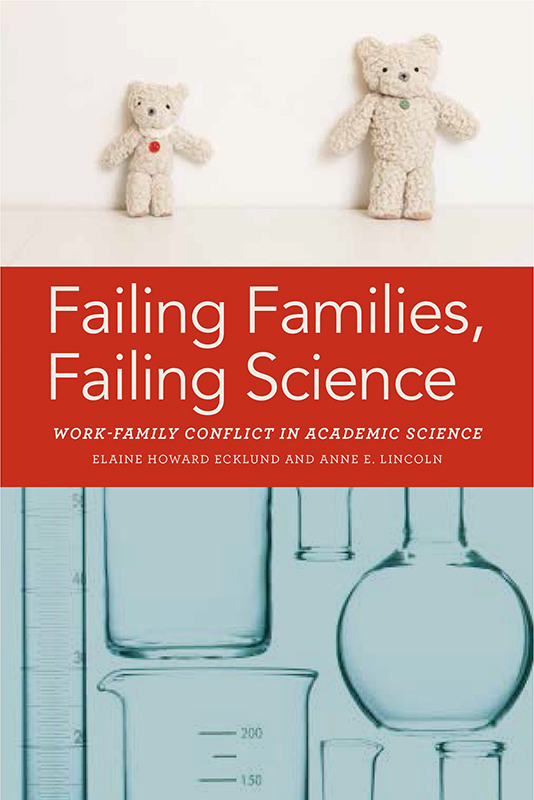
Failing Families, Failing Science
Failing Families, Failing Science
Work-Family Conflict in Academic Science
Elaine Howard Ecklund and Anne E. Lincoln

NEW YORK UNIVERSITY PRESS
New York
NEW YORK UNIVERSITY PRESS
New York
www.nyupress.org
2016 by New York University
All rights reserved
References to Internet websites (URLs) were accurate at the time of writing. Neither the author nor New York University Press is responsible for URLs that may have expired or changed since the manuscript was prepared.
Library of Congress Cataloging-in-Publication Data
Names: Ecklund, Elaine Howard, author.
Title: Failing families, failing science : work-family conflict in academic science / Elaine Howard Ecklund and Anne E. Lincoln.
Description: New York : New York University Press, 2016. | Includes bibliographical references and index.
Identifiers: LCCN 2016010267| ISBN 978-1-4798-4312-1 (cl : alk. paper) | ISBN 978-1-4798-4313-8 (pb : alk. paper)
Subjects: LCSH: Scientists. | ScientistsFamily relationships. | Work and family. | ScienceVocational guidance. | ScienceStudy and teaching (Higher)
Classification: LCC Q147 .E336 2016 | DDC 306.3/6dc23
LC record available at https://lccn.loc.gov/2016010267
New York University Press books are printed on acid-free paper, and their binding materials are chosen for strength and durability. We strive to use environmentally responsible suppliers and materials to the greatest extent possible in publishing our books.
Manufactured in the United States of America
10 9 8 7 6 5 4 3 2 1
Also available as an ebook
Contents
We are thankful to the undergraduates, graduate students, and postdoctoral fellows who tirelessly collected and analyzed data as part of the Perceptions of Women in Academic Science study. Special thanks to Catalina Crespo, Jon Endean, Katherine Sorrell, Meagan Alley, Meghan Binford, Sarah James, and Vineeta Kapahi. Many thanks to undergraduate and graduate students who helped with data analysis: special thanks to Esther Chan, Claire Cummins, Celina Davila, Douglas DeVries, Hasitha Dharmasiri, Darian Dolenc, Allison Ecklund, George Enriquez, Naomi Fa-Kaji, Alyssa Fornara, Katie Fusco, Daniel Gillespie, Molly Goldstein, Mauri Gustafson, Henry Hancock, Jessie Ho, Cecilia Hutchings, Leigh Anne Jackson, Patrick Kelly, Rachel LaTouche, David Liou, Alley Lyles, Ryan Mulvenna, Laura Orr, William Pahl, Kelsey Pedersen, Rija Qureshi, Sara Smith, Cassandra Tansey, Kseniia Tokarieva, Ann-Hunter Van Kirk, Virginia White, and Lilly Yu. Thanks to Susan Ecklund, Laura Achenbaum, Heather Wax, Hayley Hemstreet, and Shelby Allen for manuscript preparation help. Thanks to Gwynn Thomas of the University at Buffalo, who read the manuscript in its early stages. This book was reviewed as part of the Religion and Public Life Programs Books in Public Scholarship workshop. We are grateful to Erin Cech, Melinda Fagan, Sally Gallagher, David Johnson, Xavia Karner, Mary Ellen Konieczny, Laura Kramer, Elizabeth Long, Kirstin Matthews, Maria Oden, and Jared Peifer for taking the time to review this work in its entirety. Any weaknesses are ours alone.
Thanks to the National Science Foundation, Gender in Science and Engineering Program, for generously funding this research through grant number 0920837. Were thankful to New York University Press and our editor Ilene Kalish. Finally, we extend our gratitude to our families. Elaine is especially grateful for the support of Karl and Anika.
When Nothing Matters Except Science
The main discrimination in the sciences I see is this idea that there is an ideal scientist. Theres one particular type of person who does science. They like to work fourteen-hour days, and they think in a particular way, and their one and only passion is doing research.... Im not that person, [and I] wonder if that means Ill never be a good scientist.
Jennifer, physics graduate student
Jennifer, a twenty-five-year-old physics student, fell in love with science while she was in high school, after she read Cosmos by the astronomer Carl Sagan. She has spent years pursuing her academic studies, and she is doing well in her graduate program. Yet she is questioning her future in academic sciencehow well she can fit in, her ability to succeed, whether she will be able to have a family and be a successful scientist, and whether she has what it takes to be good at the career she thought she wanted.
When we met her, Jennifer, one of the most professionally dressed and articulate scientists we interviewed for our study, wore jeans and a blue blazer, accessorized with a nice scarf. We were surprised to learn her young age and thatalthough it seems she is just startingshe is already questioning her future in science. Jennifer also exemplifies a sea change in academic science. She is troubled by her perception that there is an unspoken expectation to be an ideal scientist, and as a result, she questions her own ability to succeed in science even though she is doing well in her graduate program.
That is because, for quite some time and still today, science has promoted a strong and clear idea of the ideal scientist, and it doesnt match up to someone like Jennifer. An ideal type, according to sociologist Max Weber, is the central form of a group or an idea that we all treat as if it were true, whether or not it is.the expectation that insiders seek to live up to and that outsiders expect. From listening to scientists, we learn that the ideal scientist in the American university is a man, with a supportive wife who takes care of all his personal matters. If his wife is employed, her job takes a backseat to his; his scientific work is seen as a calling; her work is seen as just a job. This ideal scientist knew from a very young age that he wanted to do science and was always encouraged and inspired by his family. He never had any doubts about his desire to pursue this career. The ideal scientist often starts out as a lonely graduate student who spends most of his time on work, with few outside interests and little yearning to pursue other activities. As an established scientist, he has cultivated an ability to overcome any obstacles to getting work done. His work takes priority over family life. The ideal scientist can have children and often does, but his scientific work receives his full and undivided devotion. Work is his joy, his hobbyhis whole life.
There are still some scientists who live up to this ideal, or are trying to. Most cannot. On these pages, we argue that they should not. The nature of science is changing, and, with it, so must the model of the ideal scientist and the structure of science itself.
Who Is the Ideal Scientist?
Arthur is a professor in his early seventies who leads a bustling physics lab where he started as a postdoctoral fellow decades ago. Still bearing a felt-board office directory that looks straight out of the 1970s, Arthurs lab building harkens back to a different timeand, in many ways, Arthur does too. He describes himself as arrogantly confident. When asked how he balanced work responsibilities with being a father to his two now-grown sons, he explained that, over the course of his fifty-year marriage, his wife did everything... I did physics and she did the rest. Echoing Arthurs sentiments, another senior professor of physics, in his early sixties with two grown sons, admitted, I like working, its basically my hobby. Its wonderful that people would pay me to do what Im doing... dont tell anyone, but I would do it anyway if given the opportunity!
Next page
